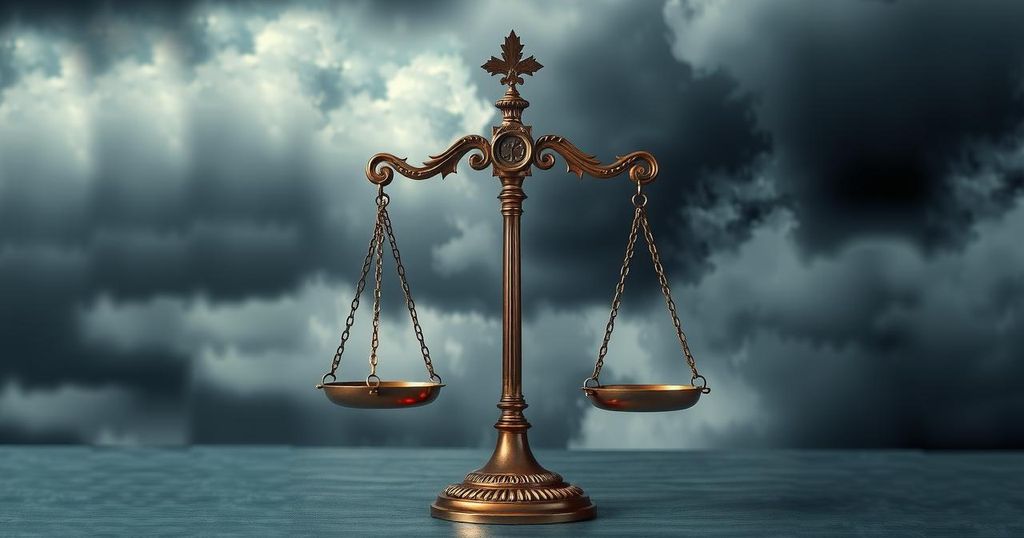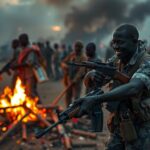Conflicts
AFRICA, ANTONY J. BLINKEN, BLINKEN, CIVIL WAR, COLIN POWELL, DARFUR, HUMAN RIGHTS VIOLATIONS, JANJAWEED, KENYA, MILITARY, MOHAMED HAMDAN, NAIROBI, R. S. F, RAPID SUPPORT FORCES, SECURITY, SUDAN, SUDANESE PARAMILITARY GROUP COM, TERRORISM, TREASURY DEPARTMENT, UNITED NATIONS, WAR CRIMES
Sophia Klein
U.S. Declares Genocide in Sudan Amid Civil Conflict
The U.S. declared genocide in Sudan, focusing on the Rapid Support Forces’ crimes, including ethnic violence and sexual assault, prompting sanctions against their leader. This determination highlights previous patterns of violence in Darfur and seeks to bring attention to the humanitarian crisis exacerbated by the civil war, which has led to tens of thousands of deaths and massive displacement.
On Tuesday, the United States officially recognized genocide occurring in Sudan, primarily attributed to the Rapid Support Forces (R.S.F.) and allied militias amidst the ongoing civil war. Secretary of State Antony J. Blinken affirmed that these groups committed heinous acts, including ethnic violence, rapes, and massacres against specific ethnic communities, particularly in Darfur. The U.S. Treasury Department announced sanctions against Gen. Mohamed Hamdan, the R.S.F. leader, and several companies connected to the group, primarily located in the United Arab Emirates.
Blinken characterized the situation saying, “The R.S.F. and allied militias have systematically murdered men and boys — even infants — on an ethnic basis,” referring to the targeting of women for sexual violence. This determination is historic, echoing a previous genocide label by the U.S. in 2004 regarding the Janjaweed militias, which have evolved into the R.S.F. and are now engaged in conflict against Sudan’s military.
The ongoing civil unrest in Sudan has had catastrophic effects, causing tens of thousands of deaths and displacing over 11 million, with atrocities reported on both sides. While both the army and R.S.F. are responsible for significant violence, only the R.S.F. has been specifically accused of ethnic cleansing, particularly against the Masalit ethnic group. Current estimations state that as many as 15,000 deaths occurred in the city of Geneina due to R.S.F. actions since the outbreak of the war in April 2023.
The U.S. government’s decision followed extensive deliberation to determine if the genocide label was warranted. Concerns were raised regarding perceptions of the Biden administration’s stance on genocides, especially in Palestine. Ultimately, Blinken authorized the genocide determination during recent travels in Asia.
While under international law this recognition does not mandate U.S. actions, sanctions are intended to enforce accountability. Experts believe this determination may enhance calls for justice in a conflict with up to 150,000 fatalities. Furthermore, it casts scrutiny on the United Arab Emirates, known for providing the R.S.F. with military support.
Secretary Blinken clarified that the U.S. does not endorse either combatant in the conflict, stating, “Both belligerents bear responsibility for the violence and suffering in Sudan.” The recent findings have been met with some skepticism. Former diplomat Cameron Hudson remarked on social media that the measures may be inadequate given the extent of the devastation already experienced.
The recognition of genocide in Sudan comes amid a brutal civil conflict pitting the Rapid Support Forces against the Sudanese military, leading to egregious human rights violations. This declaration of genocide highlights the urgent need for international awareness and action in response to the ongoing atrocities, particularly those affecting specific ethnic groups in Darfur. The U.S. has a historical context regarding the Darfur region—having labeled a similar situation as genocide nearly two decades ago, signaling continued patterns of violence and ethnic cleansing in the area.
In summary, the U.S. government has formally acknowledged genocide in Sudan due to the actions of the R.S.F., accompanied by targeted sanctions. The gravity of the situation underscores the necessity of international engagement to address the humanitarian crisis, while also reflecting past patterns of violence in the region. The actions taken may spur further accountability measures and highlight the role of foreign support in the ongoing conflict.
Original Source: www.nytimes.com








Post Comment